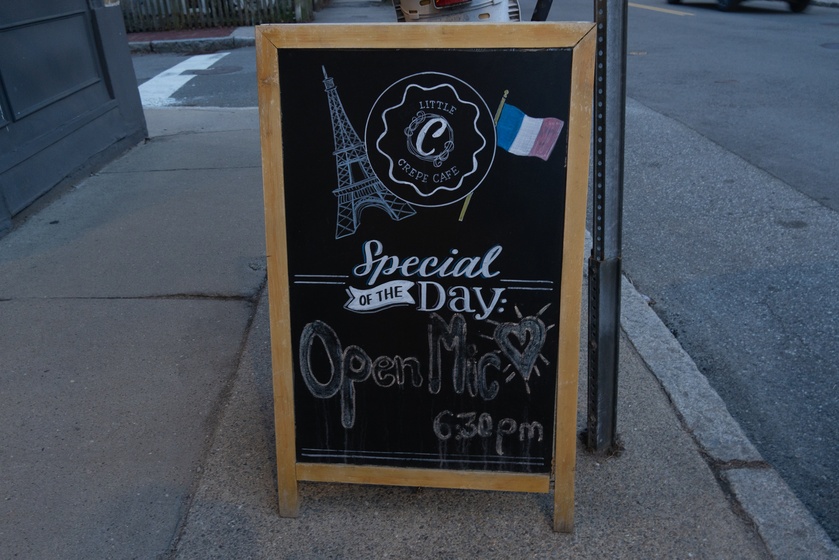{shortcode-97eb9d09a5478982fdeef420732998625d0d29c7}
{shortcode-429a20a43b31c14ee603587b9f7215faac9b0e1d}ollow Oxford Street past the Northwest Building, and the university complexes start giving way to colonial-style homes and elementary-school playgrounds. Here, you will find an artist’s haven strung up with fairy lights within a Parisian-style coffeehouse — the Little Crêpe Café.
Portraits of James Baldwin and Malcolm X share the walls with vibrant, abstract canvases. “An unjust fate inflicted, / Upon a land still full of welcome…” reads a poem hanging below a Rothkoesque landscape — one of many furnishing the space. Even the bathroom bursts with bright watercolors and intriguing quotes: “un poème, c’est comme un enfant,” declares one frame above the sink.
On the first Friday of April, we head to the café for the latest installment of Cambridge Night Readings, a weekly series partnering with the Cambridge Arts Council for National Poetry Month. Though we are among the first to arrive, every seat in the coffeehouse is filled within minutes. At the heart of this community stands Jean Dany Joachim. A poet from Haiti, he previously served as Cambridge’s “Poet Populist” and has owned the café for the past three years. He produces these readings and emcees them too, warmly welcoming each performer to the mic in a fluid mix of English, French, and Creole. “It’s all the usual suspects,” he says, surveying the crowd from the front of the café. And with that, the night begins.
One of the first performers begins by telling the crowd that they didn’t know they were a poet until Dany whirled them into his orbit just a few months ago. In their first poem, “Only Hope,” they reflect on being trans “under a fascist government,” remind the audience that “we have tried hate before,” and resolve to meet even those who despise them with love. In “How Much More,” written that very morning, they decry the detention of Rumeysa Öztürk, an international student from their alma mater, Tufts.
What follows is a series of performances as eclectic as their performers. A man with scraggly hair and a hypnotic voice turns out to be a fiddler as well as a poet, interspersing his verses with lively Gaelic tunes. “You have to sweat,” he chants with feeling, “to be an artist among inmates.”
An elderly Radcliffe alumna from Wales reads “Fern Hill” by Welsh poet Dylan Thomas. “I am not a poet,” she admits easily, before harkening back to her college days when she read the same poem for the Radcliffe Choral Society.
Another performer unspools his life in a series of vignettes written over 75 years. Through poems like “The Willow and the Oak” and “I Missed My Dad’s Funeral,” he recounts facing his father’s homophobia, negotiating love triangles, and finding hope in the open-mindedness of younger generations.
“We give people voices,” Dany says of these Friday nights. Indeed, however different their styles, experiences, and nationalities may be, all the performers are united by their depth of vulnerability and force of personality. “Yes, I Can Do It,” one woman tells the room, returning to the café after two years to speak about her fight to maintain self-confidence and dignity in the face of homelessness. A freshman in college reflects on the violent loss of her hometown in Myanmar in her poem, “Which Way Home.” Each speaker is met with warm applause from the crowd and encouraging words from Jean Dany. Embracing the freshman after her performance, he tells the crowd: “If you don’t have a home, this is the place.”
This, as Dany repeatedly reminds us, is “an event about the power of words”— a power anyone can claim. And while Dany envisions this community of artists as a sanctuary, people do not come here for passive shelter. Instead, they uplift and organize. They build each other up, laughing and applauding loudly after every performance. “Even planting a flower can be a revolution,” affirms Parama Chattopadhyay, a poet who co-owns an artists’ collective and gallery in Somerville called Out of the Blue.
“I need the arts to exist,” Dany tells us. After all, there is something about these readings that keeps people coming back, week after week, walking or driving or even Zooming in from as far as Haiti to join the crowd.
“I am not even afraid of tomorrow,” Dany says. “I welcome tomorrow.”


